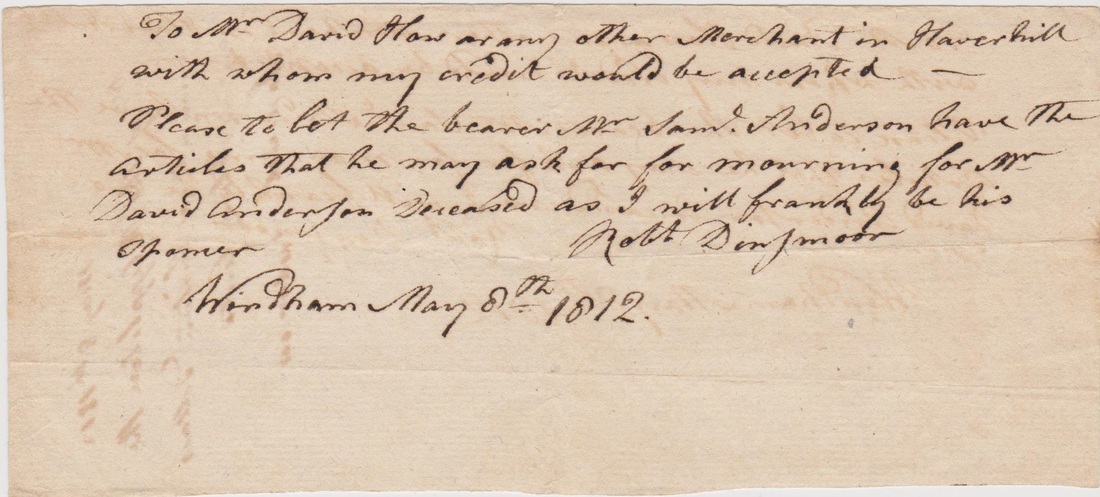At the age of eighteen, he served three months in the Revolutionary
army, and subsequently at several different times. He was at
the capture of Burgoyne. At the age of twenty-live he married
Mary Park, of Windham, and settled on a part of his father's
farm, at the east end of Cobbett's Pond, where he spent the remainder
of his life in farming. He was an elder in the Presbyterian church, in
Windham, for about fifty years, and much of that
time was clerk of the session. He was a Presbyterian of the
straightest sect. An anecdote is related of him, and many such
might be told, which illustrates the truth of this. For many
years after the settlement of the town, every tax-payer was
obliged to contribute towards the support of preaching in the
town, and there was but one church, the Presbyterian. During
the ministry of Rev. Samuel Harris, a shoe-maker, who was a
Methodist, moved into the town. He often asked Mr. Harris if
he would exchange some Sunday with a Methodist minister from
another place. Not meeting with success in obtaining the request,
he one day told Mr. Harris that if he would exchange with his
favorite Methodist minister, Mr. Peaslee, he would make him a
nice pair of calf-skin boots. The good man had a large and
somewhat expensive family, and his salary was only four hundred
dollars per year. The earnest importunity of the shoe-maker,
coupled with the promise of the calf-skin boots, broke down for
him the barrier of sect that stood between the Methodist and the
Presbyterian ; but he dared not make the arrangements for the
exchange without consulting his elders. When the matter was
laid before the session. Deacon Dinsmoor at once exclaimed,
" Mr. Harris ! Mr. Harris ! would you sell your soul to the divil
for a pair of boots'?"
He was a constant attendant on the church
services, always taking part in the singing, though in his declining
years he sat in his own pew. He was very apt in conducting
religious meetings in private houses, as well as in the district
school-houses. He would read a hymn with great good taste,
and strike a familiar tune, in which old and young could join,
thus making the meeting inviting, by its music, to those who would
not come to hear the simple Calvinistic truth, as taught by the
good elder. He was a most genial companion, very fond of society,
and maintained, for one situated as he was, with much ol
the time only a weekly mail, a large correspondence. Then again,
he was called upon for a poem, at any and all times, without fee
or reward. If a church was to be dedicated, a minister ordained,
a new school-house built, or a Fourth of July celebrated. Uncle
Robert must contribute a poem to the occasion. His friends
never considered that while he was writing for their amusement
and gratification, the weeds were growing in his corn, or that the
hay standing in the field might be caught by a shower, and the
"wolf" might be looking in at the door. Twenty years before his death, the "Rustic Bard" had a paralytic shock, which came near resulting fatally, and for even a
greater length of time, he was so bowed with rheumatism as to
be unable to stand erect. Still, he was a powerful man physically, and
lived to the good old age of seventy-nine. He died of
pneumonia after a brief illness, at his ow^n home, March 16, 1836.
we have been able to learn but little. That she was a most
excellent wife and mother, the frequent affectionate mention of
her name, by her husband and large family of children, gives
indubitable proof.
On Dec. 31, 1801, he m. for his second wife, Mary, dau. of
John Davidson, and the widow of Samuel Anderson, of Londonderry.
She occupied the trying place of step-mother to a large
family with singular good judgement, and won the affection of the
children and grandchildren of her husband. To all the boys and
girls of the neighborhood, she was known by the endearing name
of "Aunt Molly." She survived her husband, and d. Jan. 19,
1838. She was b. March 17, 1754. Children: --
